
The industry of film has a remarkable ability to cross international borders, enabling the exchange and adaptation of cultural elements. One such instance of this cross-cultural resonance can be found in the Bollywood song "Chhalka" from the movie "Saathiya," which was included in the Hollywood movie "The Accidental Husband." The ability of music to unite people from different cultures and countries is demonstrated by the musical fusion. We will look at the development of "Chhalka" in this article, from its inception in Indian cinema to its inclusion in a Hollywood production.
The charming song "Chhalka" appears in the 2002 Indian movie "Saathiya," which was directed by Shaad Ali and produced by Mani Ratnam and Yash Chopra. Aditya and Suhani, a young couple, navigate the ups and downs of marriage and love in this Hindi-language romantic drama. Vivek Oberoi and Rani Mukerji play the couple. The soundtrack for the movie, which was created by the legendary A.R. Rahman and greatly aided in the success of the film in India.
An important scene in the movie is the song "Chhalka," which perfectly captures romance and youthful vitality. The song, which is sung by Richa Sharma and Srinivas and has lyrics written by Gulzar, has stunning choreography, vibrant visuals, and is Rahman's signature fusion of Indian and modern Western musical elements. It became a huge hit with Indian audiences right away thanks to its upbeat melody and moving lyrics, solidifying its place in Bollywood's musical hall of fame.
Gryphon Dunne's "The Accidental Husband" is a 2008 romantic comedy movie with Uma Thurman, Colin Firth, and Jeffrey Dean Morgan. The main character of the movie is a love advice columnist named Emma (Uma Thurman), who gets legally married to a firefighter named Patrick (Jeffrey Dean Morgan) thanks to a mix-up a rogue radio show host caused. Patrick starts to pursue Emma as she tries to dissolve the marriage, setting up a number of romantic and comedic scenarios.
Despite the fact that "The Accidental Husband" is a classic Hollywood romantic comedy, it may surprise you to learn that "Chhalka" was included in this movie. The song's inclusion can be attributed to the movie's global perspective and its creators' desire to include a small element of Indian culture in the story.
The inclusion of "Chhalka" in "The Accidental Husband" is a shining example of cross-cultural integration in film. Music frequently plays a key role in Hollywood's practise of fusing elements from various cultures to appeal to a diverse international audience.
During a crucial romantic scene involving Emma and Patrick, the word "Chhalka" is used in the movie. Because of how melodic and evocative the song is, it perfectly captures the characters' feelings and heightens the romantic ambiance of the scene. In addition to giving the movie depth, this musical fusion of different cultures also acts as a link between two different cinematic universes.
The inclusion of "Chhalka" in "The Accidental Husband" sparked a great deal of interest and debate among audiences in both India and the West. Bollywood music has a special ability to transcend language barriers and touch the hearts of people all over the world thanks to its vibrant compositions and emotional resonance. In this instance, "Chhalka" demonstrated the universality of music's emotional power by bringing a touch of Indian culture to a Hollywood production.
This musical exchange also made it possible for the Indian and Western entertainment industries to work together. It emphasised the potential for more intercultural collaborations, encouraging musicians and filmmakers to discover new ideas and produce art that speaks to the current state of the world's globalisation.
The Hollywood film "The Accidental Husband"'s use of the song "Chhalka" from "Saathiya" is proof of how music has the ability to cross cultural barriers and unite people from different countries. It demonstrates Bollywood music's enduring appeal and capacity to connect with listeners all over the world. This cross-cultural blending not only improved the cinematic experience, but it also opened the door for future partnerships between the Indian and Western entertainment industries. Such creative interactions serve as a timely reminder of the value of embracing cultural diversity in the film industry in an era when the world is becoming more interconnected.
Funtoosh (1956) – A Bollywood Classic with Hollywood Roots
Why 'R...Rajkumar' Stole Hearts and Theatrical Screens in B and C Centers